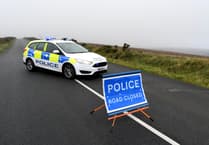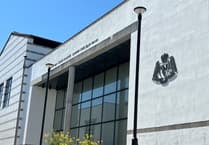Modern slavery is present in the Isle of Man right under our noses, the island advocate who has done more than anyone else to highlight the issue has warned.
Some 165 people packed into Promenade Methodist Church Hall gave a standing ovation to Maria Bridson following her harrowing account of migrants living here in fear after being duped with the offer of fake jobs.
‘Sometimes these gangs offer fake documents, fake jobs but it’s always fake dreams and it always ends up with crushed people,’ she said.
Maria referred to reports alleging organised criminal gangs had infiltrated the Isle of Man, exploiting lax regulation and immigration controls to launder the proceeds of industrial scale scamming operations based in Asia - a development she said risked destroying the island’s international reputation.
The event, held the day before Anti-Slavery Day, was organised by the Association of Corporate Service Providers and the Alliance of Isle of Man Compliance Professionals.
Maria Bridson, senior advocate at BridsonHalsall Advocates, was recently awarded the 2024 Deemster Kerruish Endeavour Award in recognition of her work with victims of modern slavery.
During her talk, she told the story of Jenny - not her real name - a 48-year-old Filipino who had been working in the Middle East when she came across a Facebook advert offering a great job opportunity in the UK as a cleaner with good rates of pay. The ad was plausible and the agents she spoke to were persuasive.
She sold land back in the Philippines, spent all her savings and borrowed money to pay the £2,500 to the recruitment agent. She paid for her own visas, flights and medical tests - in total about £5,000 but it was an investment in her future.
But shortly before her departure, she was asked for more money - for an additional flight to a place called Ronaldsway. By this stage she had quit her job, left her flat and cancelled her visa in the Middle East.
‘There was no going back so she borrowed yet more money and got on the flight,’ said Maria.
‘She had never heard of the Isle of Man before she landed here and it was at that stage that her dream job turned into a nightmare.’
Instead of working as a cleaner in a hotel as promised, Jenny was sent to process shellfish. It was long hours, and cold, hard work.
Maria said: ‘When I saw Jenny she was thin and her hands were curled over from shelling shellfish.
‘She was getting less than the minimum wage, less than £300 a week for 40 hours and that salary shrank even further when the gangmaster took away £42 deductions from her salary because he had “expenses”.’
Jenny slept on the bottom bunk in a child’s bedroom in a property in Onchan. The top bunk was occupied by an unrelated woman.
She complained to the gangmaster that this wasn’t the job she expected and how ill it made her feel. The gangmaster told her ‘if you want to leave and go and work for someone else you need to pay £2,500’.
Maria said: ‘Jenny was stuck. The gangmaster told her she had no employment rights and no one else could help her and if she complained she would be arrested and deported and sent home.
‘When I met Jenny she was pale and scared. When I went back to meet her a second time there were 15 other people waiting to see me, men and women all who had the same story.
‘They had all paid between £1,500 and £25,000 for their jobs here in the Isle of Man. It’s really humbling to watch adult men and women cry in front of you. And ever so scared for exactly the same reasons as Jenny - they were all in debt and the very worst thing that can happen for them is to be sent home penniless and in shame.’
That particular case involved no fewer than 241 victims, the shocked audience was told.
Maria added: ‘You would have thought when the immigration office was manually completing paper forms that when they have gone into application 75, or 170, they might have noticed it was issuing permission documents to a two-bed house in Onchan.
‘They didn’t - our systems didn’t join the dots together. They didn’t know whether these people were in the Isle of Man, in the UK, still overseas, no idea of where they were working or what their living conditions were.
‘These were hidden people living in fear under our noses.’
After Jenny moved out, that same child’s bedroom was occupied by four men, all unrelated - one sleeping on the floor, two in the lower bunk and one in the top bunk.
Police have many separate ongoing investigations into organised immigration crime in the Isle of Man, the audience heard.
Maria said every week her team is approached by different people with examples of modern slavery and labour exploitation - care workers alleging they were sexually molested or racially abused and told not to complain as it would risk their visa status, £300 ‘tributes’ paid upwards to line managers, jobs that involve going to clean the boss’s house or look after their children at weekends for no pay.
She added: ‘Modern slavery is here in the Isle of Man and we don’t see it. I’m guessing because most of us didn’t get on the bus at 6am to get to work and most of us don’t live in a dodgy flat off the back of Douglas Promenade. We live in a very different world to them.’
Her presentation ended with the good news that the group of migrants Maria’s team have helped have all got new, well-paid jobs here with good employers. ‘They are different people to what they were 12 months ago,’ she said.
.jpg?trim=0,239,0,61&width=669&height=445&crop=669:445)



